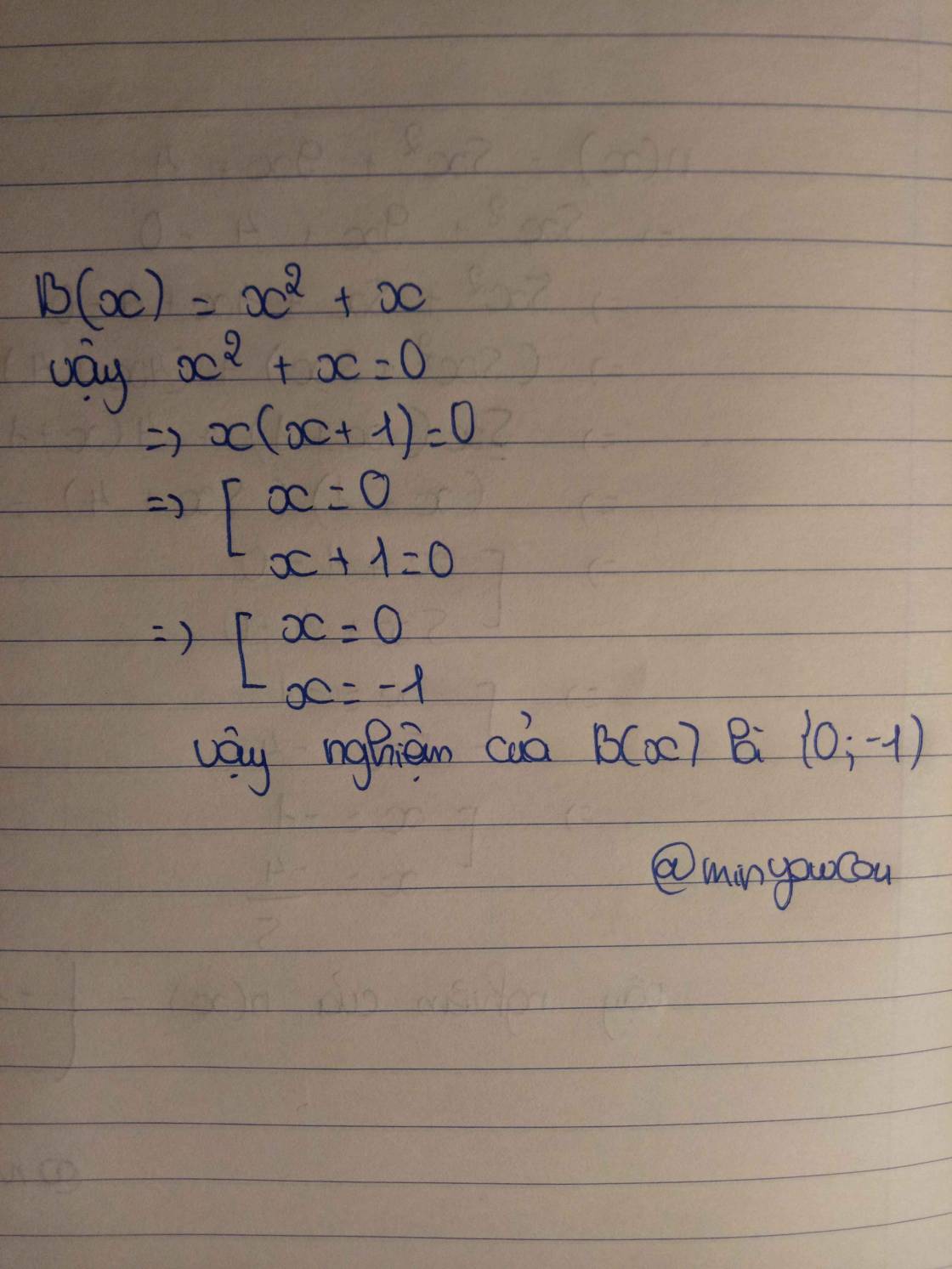
Hãy nhập câu hỏi của bạn vào đây, nếu là tài khoản VIP, bạn sẽ được ưu tiên trả lời.


Đặt \(-16x^2+7x+18=0\)
\(\text{Δ}=7^2-4\cdot\left(-16\right)\cdot18=1201>0\)
Do đó: Phương trình có hai nghiệm phân biệt là:
\(\left\{{}\begin{matrix}x_1=\dfrac{-7-\sqrt{1201}}{-32}=\dfrac{7+\sqrt{1201}}{32}\\x_2=\dfrac{7-\sqrt{1201}}{32}\end{matrix}\right.\)

cho B(x) = 0
\(=>-5x+30=0\Rightarrow-5x=-30\Rightarrow x=6\)
cho E(x) = 0
\(=>x^2-81=0\Rightarrow x^2=81=>\left[{}\begin{matrix}x=9\\x=-9\end{matrix}\right.\)
cho C(x) = 0
\(=>2x+\dfrac{1}{3}=0=>2x=-\dfrac{1}{3}=>x=-\dfrac{1}{6}\)
bạn tham khảo hai câu này nha vì mình ko biết là mấy câu còn lại
B(x)=-5x+30
cho B(x)=0
=> -5x+30=0
-5x=-30
x=-30:(-5)
x=-6
* Vậy nghiệm của đa thức B(x) là -6.
C(x)=2x+1/3
cho C(x)=0
=>2x+1/3=0
2x=-1/3
x=-1/3:2
x=-1/6
vậy nghiệm của đa thức C(x) là -1/6.

\(a,x^2-2=0\Leftrightarrow x^2-\left(\sqrt{2}\right)^2=0\Leftrightarrow\left(x-\sqrt{2}\right)\left(x+\sqrt{2}\right)=0\Leftrightarrow\left[{}\begin{matrix}x=\sqrt{2}\\x=-\sqrt{2}\end{matrix}\right.\)
Vậy \(S=\left\{-\sqrt{2};\sqrt{2}\right\}\)
\(b,x\left(x-2\right)=0\Leftrightarrow\left[{}\begin{matrix}x=0\\x=2\end{matrix}\right.\)
Vậy \(S=\left\{0;2\right\}\)
\(c,x^2-2x=0\Leftrightarrow x\left(x-2\right)\) phương trình như câu b,
\(d,x\left(x^2+1\right)\Leftrightarrow\left[{}\begin{matrix}x=0\\x^2+1=0\end{matrix}\right.\Leftrightarrow\left[{}\begin{matrix}x=0\\x^2=-1\left(voli\right)\end{matrix}\right.\)( voli là vô lí )
Vậy \(S=\left\{0\right\}\)

a) \(\left(x-1\right)\left(x+5\right)=0\Rightarrow\left[{}\begin{matrix}x-1=0\\x+5=0\end{matrix}\right.\)\(\Leftrightarrow\left[{}\begin{matrix}x=1\\x=-5\end{matrix}\right.\)
b) \(x+1x^2+1=x^2+x+1=x^2+2.\dfrac{1}{2}x+\dfrac{1}{4}+\dfrac{3}{4}=\left(x+\dfrac{1}{2}\right)^2+\dfrac{3}{4}\ge\dfrac{3}{4}>0\)với mọi x.
=> Pt vô nghiệm.
c) \(x^2+4x=0\Leftrightarrow x\left(x+4\right)=0\Leftrightarrow\left[{}\begin{matrix}x=0\\x+4=0\end{matrix}\right.\)\(\Leftrightarrow\left[{}\begin{matrix}x=0\\x=-4\end{matrix}\right.\)
P/s: Check lại đề ý b nhé.
a) Ta có:(x-1)(x+5)=0
\(\Leftrightarrow\left[{}\begin{matrix}x-1=0\\x+5=0\end{matrix}\right.\Leftrightarrow\left[{}\begin{matrix}x=1\\x=-5\end{matrix}\right.\)
Vậy: S={1;-5}
b) Ta có: \(x^2+x+1=0\)
\(\Leftrightarrow x^2+2\cdot x\cdot\dfrac{1}{2}+\dfrac{1}{4}+\dfrac{3}{4}=0\)
\(\Leftrightarrow\left(x+\dfrac{1}{2}\right)^2+\dfrac{3}{4}=0\)(Vô lý)
Vậy: \(S=\varnothing\)
c) Ta có: \(x^2+4x=0\)
\(\Leftrightarrow x\left(x+4\right)=0\)
\(\Leftrightarrow\left[{}\begin{matrix}x=0\\x+4=0\end{matrix}\right.\Leftrightarrow\left[{}\begin{matrix}x=0\\x=-4\end{matrix}\right.\)
Vậy: S={0;-4}

1. F(-1) = 2.(-1)2 – 3. (-1) – 2 = 2.1 + 3 – 2 = 3
F(0) = 2. 02 – 3 . 0 – 2 = -2
F(1) = 2.12 – 3.1 – 2 = 2 – 3 – 2 = -3
F(2) = 2.22 – 3.2 – 2 = 8 – 6 – 2 = 0
Vì F(2) = 0 nên 0 là 1 nghiệm của đa thức F(x)
2. Vì đa thức E(x) có hệ số tự do bằng 0 nên có một nghiệm là x = 0.

a) f(x) = 0 ⇔ 4 - 5x = 0 ⇔ x = \(\dfrac{4}{5}\)
Nghiệm của f(x) là \(\dfrac{4}{5}\)
b)Không có nghiệm vì Với mọi x ∈ R thì \(x^2\) ≥ 0 ⇔ \(x^2\) + 4 ≥ 4 > 0
Do đó \(x^2\) + 4 > 0 hay \(x^2\) + 4 ≠ 0
Vậy f(x) không có nghiệm

`x^2-x+1/4=0`
`<=>x^2-1/2x-1/2x+1/4=0`
`<=>x(x-1/2)-1/2(x-1/2)=0`
`<=>(x-1/2)^2=0`
`<=>x=1/2`
Vậy nghiệm là `1/2`

B(x) = x2+x
Đặt B(x) = 0
=> x2+x=0
x.x + x = 0
x(x+1)=0
TH1: x = 0
TH2: x+1 = 0
x = -1
Vậy nghiệm của B(x) là x=-1

Đặt \(B\left(x\right)=0\)
\(\Rightarrow-x^2+16=0\)
\(\Rightarrow-x^2=-16\)
\(\Rightarrow x^2=16\)
\(\Rightarrow x=\pm\sqrt{16}\)
\(\Rightarrow x=\pm4\)
Vậy \(x=\pm4\) là nghiệm của đa thức
giúp mink vs mọi người!!!